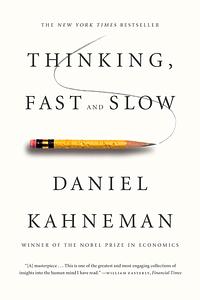You need to sign in or sign up before continuing.
Take a photo of a barcode or cover
challenging
informative
reflective
slow-paced
challenging
dark
informative
reflective
slow-paced
Although not as riveting as its blurbs promise, Thinking, Fast and Slow is a scientific odyssey into the deep fissures of human cognition and how we make the decisions impacting both our personal and professional lives.
Kahneman, based on decades of research, divides the human brain into two hemispheres: system 1, the rapid thinker, and system 2, the unhurried thinker. The former gives us our quick responses but also incites biases; the latter is accurate but often reliant upon system 1 for initial observations. The trick, Kahneman elaborates, is to bifurcate the two and comprehend both their strengths and weaknesses for effective decision-making.
While I agree with the blurbs that this is indeed a trailblazing book, let me add a caveat: most of its endorsements originate from the scientific community. What this means is that the entire text is a tedious bore if neuroscience is not your field nor your interest. Nonetheless, it dishes out valuable insights by the dozen to those foolhardy enough to traverse its mindboggling literary crevices.
And while the tone Kahneman uses would be enough to strike monotony even into the bravest of souls, the gems of wisdom he provides for decision-making more than make up for the hyper-academic terms used throughout the book.
Kahneman, based on decades of research, divides the human brain into two hemispheres: system 1, the rapid thinker, and system 2, the unhurried thinker. The former gives us our quick responses but also incites biases; the latter is accurate but often reliant upon system 1 for initial observations. The trick, Kahneman elaborates, is to bifurcate the two and comprehend both their strengths and weaknesses for effective decision-making.
While I agree with the blurbs that this is indeed a trailblazing book, let me add a caveat: most of its endorsements originate from the scientific community. What this means is that the entire text is a tedious bore if neuroscience is not your field nor your interest. Nonetheless, it dishes out valuable insights by the dozen to those foolhardy enough to traverse its mindboggling literary crevices.
And while the tone Kahneman uses would be enough to strike monotony even into the bravest of souls, the gems of wisdom he provides for decision-making more than make up for the hyper-academic terms used throughout the book.
challenging
informative
reflective
medium-paced
Illuminating. Having devoted over a year of my post-grad research to Kahnerman and Tversky's prospect theory, I was naturally drawn to Kahnerman's biggest publication in over a decade. I wasn't disappointed, as he matched the current popular behavioural economics bestsellers in story telling and ease, while packing a punch with original and serious thought. I dearly hope that I will incorporate what I learned from this book into my everyday life and will recommend this book to any serious student of human behaviour or fan of self discovery.
Engaging four stars
Rewarding four stars
Enduring three stars
Engaging four stars
Rewarding four stars
Enduring three stars
This book was really interesting but it is long and I listened to it so it took forever for me to finish. It is a great primer on psychology that reviews tons of interesting research and studies the author has conducted over his very successful career. I only absorbed a fraction of what I would have if I had read it instead, but very interesting if you are into this kind of thing.
challenging
informative
reflective
slow-paced
Even though I rated this book on the lower end, I still think it is very much worth reading. It gave rise to many interesting conversations, and the stories and examples use are better at communicating the point than the statistics - as the author points out is the nature of humans when learning and modifying behaviour. It is a great book to help formulate one’s scientific thinking, and it was fairly straightforward and easy to grasp, overall a quick book worth the time. If you are in the STEM field you’ll probably know many of these concepts, but the examples used may be useful to store up to better communicate your points to others when working in the cross functional teams every endeavour and business requires.
A very important book that has long reaching implications for decision making at a personal level and for making policy in government and other organizations.
I am going to need to read this book a second time before I write a good review, but I would highly recommend this book. If you have read a summary and think you know what’s in the book you are wrong. I think it takes example after example to actually internalize how easily we are influenced by things we don’t notice and realize how poor we are all at when it comes to thinking logically.
This could be a four or a five, but I really enjoyed the concepts and defenses of expressed in this book: the conscious and the automatic thought systems. It's the best book since Nudge in making me consider not only how I make decisions, but how my active consciousness is training my automatic systems to make those decisions.



